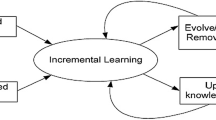Abstract
Incremental learning is widely used in artificial intelligence, pattern recognition and other fields. It is an effective method to solve the system, where samples are less in the beginning of training, but over time its performance reduces. In this paper, based on the analyses of support vector machine and the characteristics of incremental learning, we proposed incremental learning method which is based on the minimum classification error criterion. Moreover, the validity and feasibility of this algorithm is verified through experiments.
Access this chapter
Tax calculation will be finalised at checkout
Purchases are for personal use only
Similar content being viewed by others
References
Vapnik V (1995) The nature of statistical learning theory, vol 1. Springer Press, New York, pp 147–149
Zhu HB, Cai Y (2009) Text categorization based on active learning support vector machines. Comput Eng Appl 45(2):134–136
Kong R, Zhang B (2005) A fast incremental learning algorithm for support vector machine. Control Decis 20(10):1129–1136
Cao J, Liu Z (2007) Incremental learning algorithm based on SVM. Appl Res Comput 24(8):48–52
Ye S, Wang X, Liu Z, Qian Q (2011) Power system transient stability assessment based on support vector. Mach Increm Learn Method 35(11):15–19
Zhe X, Zhizhong M (2010) Incremental learning of support vector machine based on hyperspheres. J Northeastern Univ (Nat Sci) 1:16–19
Xiao R, Wang J (2001) An incremental SVM learning algorithm a-ISV. J Softw 12(12):1818–1823
Li D, Du S, Wu T(2006) Fast Incremental learning algorithm of linear support vector machine based on hull vectors. J Zhejiang Univ (Eng Sci) 40(2):203–215
Jiqing Han (2001) Discriminative learning method based on minimum classification error criterion. Electron Eng 27(2):1–12
Xiusheng Duan (2009) Research on fault diagnosis technology for a fire control system based on SVM. Shijiazhuang Mech Eng Coll 9:112–120
Author information
Authors and Affiliations
Corresponding author
Editor information
Editors and Affiliations
Rights and permissions
Copyright information
© 2013 Springer-Verlag London
About this paper
Cite this paper
Wen, B., Shan, G., Duan, X. (2013). Research of Incremental Learning Algorithm Based on the Minimum Classification Error Criterion. In: Du, W. (eds) Informatics and Management Science III. Lecture Notes in Electrical Engineering, vol 206. Springer, London. https://doi.org/10.1007/978-1-4471-4790-9_83
Download citation
DOI: https://doi.org/10.1007/978-1-4471-4790-9_83
Published:
Publisher Name: Springer, London
Print ISBN: 978-1-4471-4789-3
Online ISBN: 978-1-4471-4790-9
eBook Packages: EngineeringEngineering (R0)




